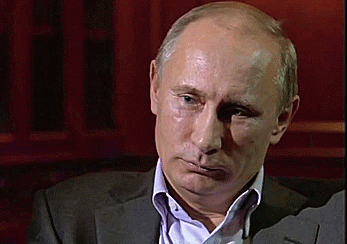A small liberal PAC is hoping to woo disaffected Millennial voters with a new advertisement—starring ISIS, Miley Cyrus, and a giggling Vladimir Putin.
By Ted Scheinman
A mural depicts Donald Trump and Russian President Vladimir Putin greeting each other with a kiss in the Lithuanian capital Vilnius on May 13, 2016. (Photo: Petras Malukas/AFP/Getty Images)
It’s definitely not a Nashville party
’Cause all I see are stilettos.
—Miley Cyrus, August 2009
One of this season’s strangest political advertisements appeared online today. On first glance, it presents a spectacle of murderous jubilation, as ISIS militants drive a tank through hairpin turns while men with AK-47s pump their fists and Miley Cyrus’ “Party in the U.S.A.” blares in the background.
The scene then switches to Pyongyang, North Korea, where crowds loyal to Kim Jong-un dance with their hands in the air, again accompanied by Cyrus. Ditto a tableau of neo-Nazis demonstrating on the streets of Europe, grinning dopily into the camera.
If ISIS were looking to recruit American sorority sisters circa 2010, the video would be remarkably effective. In fact, it’s an advertisement intended to convince young voters not to vote for Donald Trump, conceived and produced by the Democratic Coalition Against Trump, “the nation’s largest grassroots anti-Trump organization,” under the auspices of executive director Nate Lerner and cinematographer Paul Howard.
“Once we moved from the primaries to the general [election], we saw some polls saying that Millennials weren’t really coming over to the democrats,” Lerner tells Pacific Standard. “The fact that 36 percent [of Millennials] are supporting a third-party candidate and only 31 percent are supporting Hillary Clinton—that’s totally unacceptable.”
Millennials, Lerner argues, should be the main bulwark right now against a Trump presidency.
“We cannot be the generation that allows Trump to happen,” he says. “We’re the smart generation, the well-informed generation. This is the generation that’s supposed to care about the environment and about the issues. More so than any generation before, we have taken a stand against racism and hateful rhetoric, and we’re trying to use these ideas in a very aggressive approach.”
The video certainly qualifies as aggressive: It is loud and full of militant imagery—and, for the first 23 seconds or so, its politics are ambiguous to say the least. It could be ISIS-authored satire, or an expression of edgy Internet randomness, or even a pro-Trump advertisement (all that B-roll of overjoyed Islamofascists!). Only in the closing moments does a title-card make clear the moral of the video: A WIN FOR DONALD TRUMP IS A WIN FOR AMERICA’S ENEMIES. In the coda, Vladimir Putin merely giggles.

(GIF: Public Domain)
Lerner says the video’s oddness is intentional. Though his PAC didn’t put the video before a focus group, they did show it to “a lot of young people, some of whom didn’t like it,” Lerner says, “but we decided that was a good thing. Controversy is great for engagement rates online. That’s why we’ve succeeded so well on Facebook — because we’re a little edgy, a little controversial—so if this isn’t the perfect video, that’s probably a good thing, ’cause that creates debate around it.”
The music is the funniest element in the whole package, and also the most uncomfortable, two reasons that the DCAT chose it.
“It’s just such a strong contrast,” Lerner says. “It’s got an American theme, but that’s being contrasted with showing very foreign enemies celebrating. Everyone knows that song, and we really couldn’t find another one that provided the same juxtaposition and contrast. We wanted it to be a little weird, a little off—why am I seeing ISIS and neo-Nazis celebrating over ‘Party in the U.S.A.’? I guess we worried it was a little too poppy at one point, but it’s just so perfect — aggressively American, and a young song that you literally party to.”
I asked Lerner what other songs had been under consideration. He just laughed.
“We toyed with ‘Celebrate Good Times.’ But none of the other songs had that punch.”





